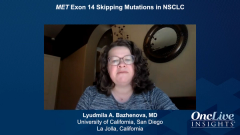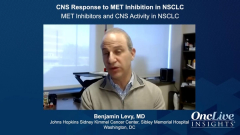
CNS Response to MET Inhibition in NSCLC
The significance of using MET inhibitors to manage patients who have MET exon 14 skipping mutations in non–small cell lung cancer with CNS (central nervous system) involvement.
Episodes in this series

Lyudmila A. Bazhenova, MD: Patients with lung cancer and MET exon 14 skipping mutations can have brain metastases. So far, the reported incidence of CNS [central nervous system] metastases at diagnosis has been approximately 17%, and the lifetime incidence in those patients has been approximately 36%. Reported probability of having brain metastases at 1, 2, and 3 years is 24%, 35%, and 38%, respectively.
Benjamin Levy, MD: It’s important to understand that in both the Geometry Mono-1 and VISION trials, evaluating capmatinib and tepotinib, respectively, patients with treated and untreated brain metastases were allowed in the studies. There weren’t a lot of patients with brain metastases, but they were allowed. That’s important, because when trials allow this, it does allow us to observe and witness the intracranial activities of these drugs, which theoretically should cross the blood-brain barrier.
In the capmatinib study, specifically, a small number of patients—14 patients—had MET exon 14 skipping mutated lung cancer and brain metastases. In at least the 13 patients they were able to follow, 12 had intracranial disease control, which is important. And 7 of those patients had intracranial response. That’s north of 50% in terms of a response rate with this drug. This was just a small number of patients.
Similar themes were noted with the tepotinib data. A small number of patients in the study had brain metastases. Of 11 patients, 55% had an intracranial response. And the duration of response in these patients was around 9 months. So this is very exciting to show, and I look forward to other data that will confirm this finding.
Joshua M. Bauml, MD: One of the major limitations that we had with the use of crizotinib in MET exon 14 skipping non–small cell lung cancer was that it did not have very good CNS penetrance. We know that patients with MET exon 14 skipping non–small cell lung cancer can experience brain metastases. One of the great advantages of capmatinib and tepotinib is that both have excellent CNS penetrance. We can and do control CNS disease with this TKI [tyrosine kinase inhibitor]. That has been wonderful for my patients who do experience brain progression. I’ve been able to see responses in the brain, which is so great because we can sometimes avoid brain radiation.
TRANSCRIPT EDITED FOR CLARITY
















































